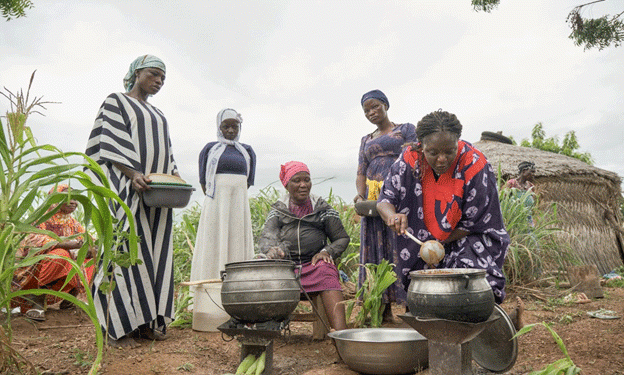In the small town of Chereponi in northeastern Ghana, the day begins with a warm bowl of Fonio porridge, a staple that nourishes families and connects generations. For 29-year-old farmer Christabel Kwasi, the successful harvest of Fonio has provided a reliable food source for her family of five. With roots in ancient West African agriculture, Fonio is a resilient crop that holds immense potential for food security, particularly in regions plagued by climatic challenges.
The Significance of Fonio
Fonio, a drought-resistant grain, has long been a dietary staple in northern Ghana, prized for its nutritional benefits and versatility. As Christabel shares, “Our grandparents often faced hunger, but Fonio is unique; it can thrive even without chemical fertilizers, providing sustenance for our family.” The celebration of Fonio harvests has become an integral part of local culture, fostering community and resilience.
Breaking Traditional Barriers
For years, Christabel and many other farmers believed Fonio could only be grown during the rainy season, which severely limited their harvests. However, with support from the Food and Agriculture Organization (FAO) and renowned chef Fatmata Binta, they have learned that Fonio can be cultivated year-round. This knowledge is crucial for families in Ghana’s rural areas, where traditional farming methods often lead to insufficient yields and food insecurity.
According to Priya Gujadhur, the FAO’s interim representative in Ghana, “The collaboration between the FAO, Chef Binta, and the Ghana Ministry of Food and Agriculture showcases that Fonio cultivation is an effective resilience-building measure for communities affected by drought.” The emphasis on improving Fonio production is not just about increasing crop yields; it’s about creating sustainable livelihoods.
Empowering Women Farmers
The FAO has organized training programs to teach women farmers advanced production and processing skills, including proper storage techniques to minimize food loss. Through these initiatives, women like Christabel have learned innovative planting methods, including row planting, which optimizes seed use and simplifies crop management.
However, the traditional processing of Fonio has been labor-intensive. Women typically hand-thresh grains, a process that is both time-consuming and physically demanding. To address this, Chef Binta introduced machinery that reduces labor while enhancing the quality and yield of the grain. “This technology not only lowers the physical strain but also increases the efficiency of processing,” she emphasizes.
Furthermore, women are being trained in proper packaging, pest management, and marketing strategies to improve their product’s marketability. These skills are transforming the way Fonio is cultivated, stored, and sold, ensuring that families can rely on this nutritious grain throughout the year.
Building a Sustainable Future
The initiative extends beyond farming techniques. It aims to raise public awareness about Fonio and its numerous benefits, encouraging consumption beyond the Chereponi area. Chef Binta’s expertise has built trust within the community, and discussions are underway to form a Fonio cooperative, which will provide a platform for collaboration and growth.
By investing in the production of Fonio and empowering women farmers, the potential for food security and improved livelihoods is significant. As Christabel states, “I want to teach more people how to grow Fonio so that we can have food every day, ensuring no one goes hungry.”
The revival of Fonio cultivation in Ghana is more than just an agricultural endeavor; it’s a pathway to empowerment and sustainability for women and their families. By embracing this ancient grain, communities can address food security challenges, support local economies, and foster resilience in the face of climate change. As Fonio gains recognition, its impact will undoubtedly be felt for generations to come.
Error





